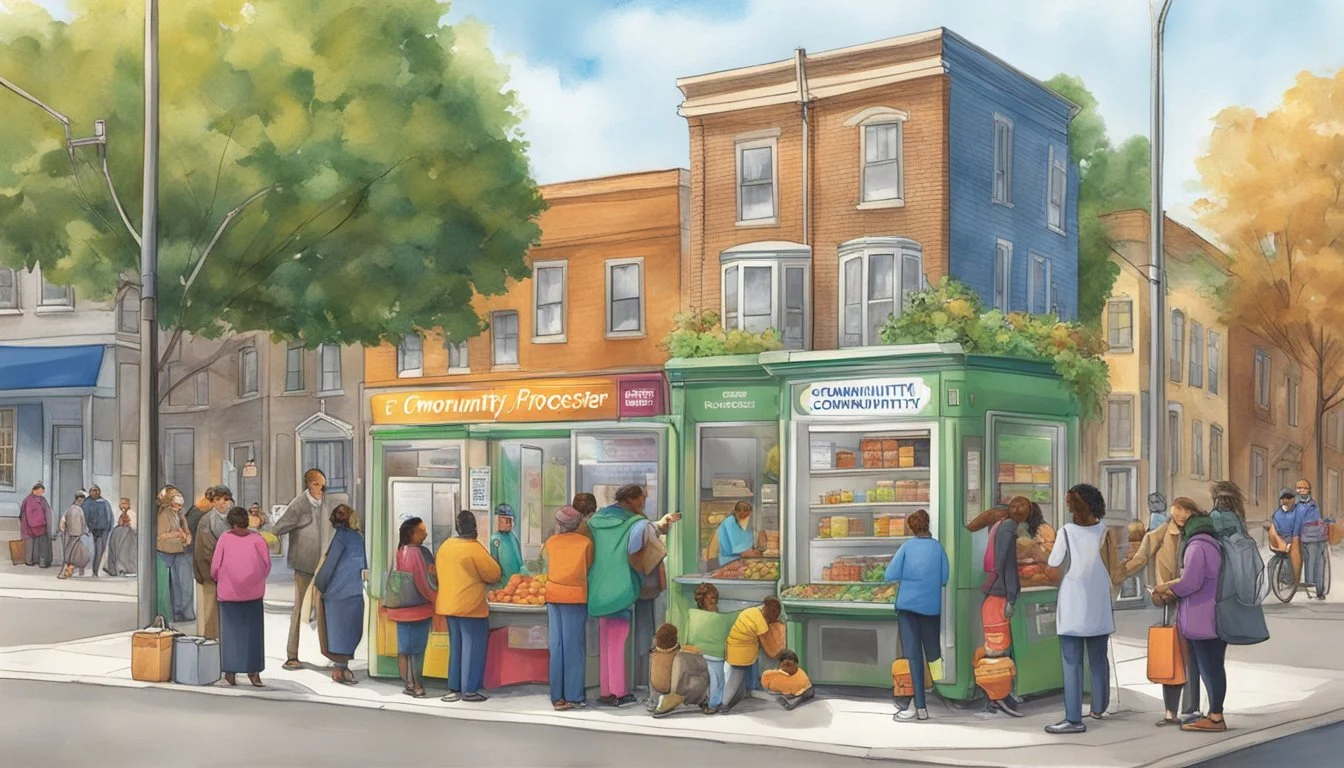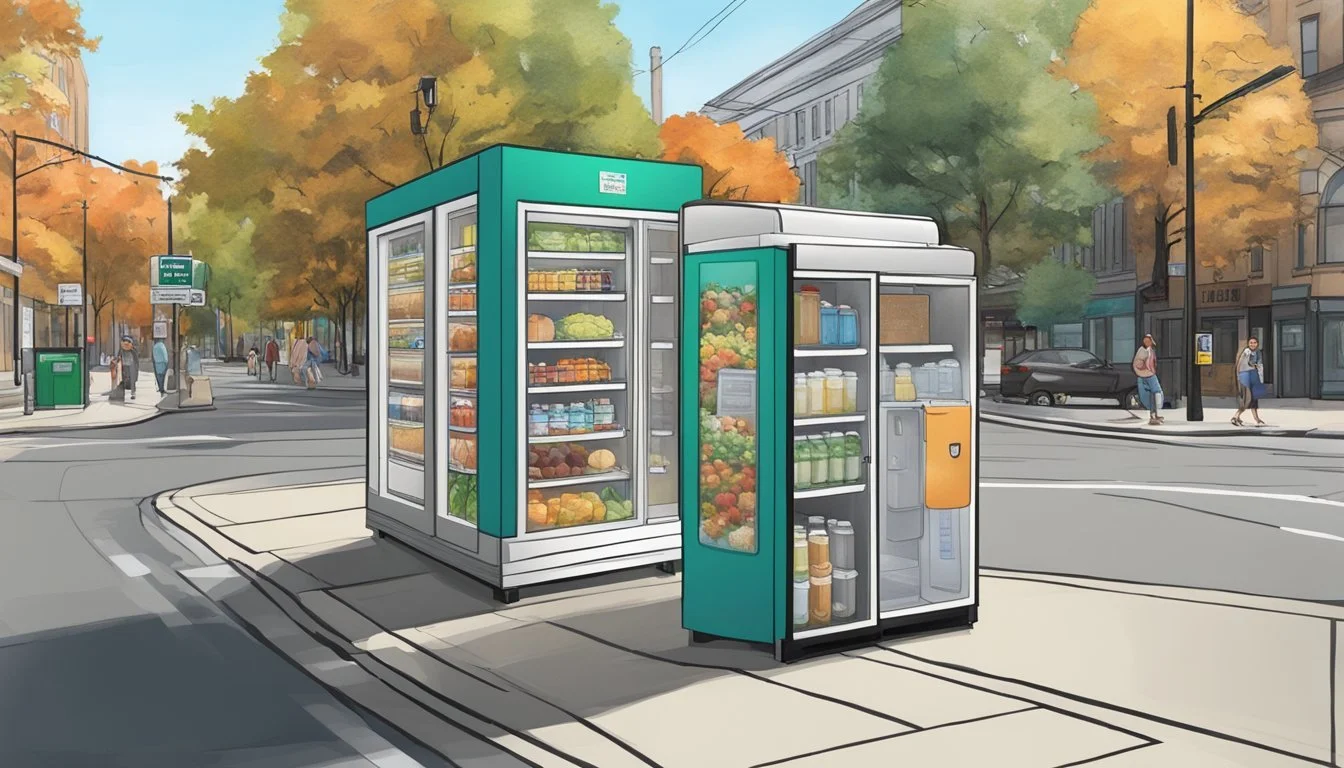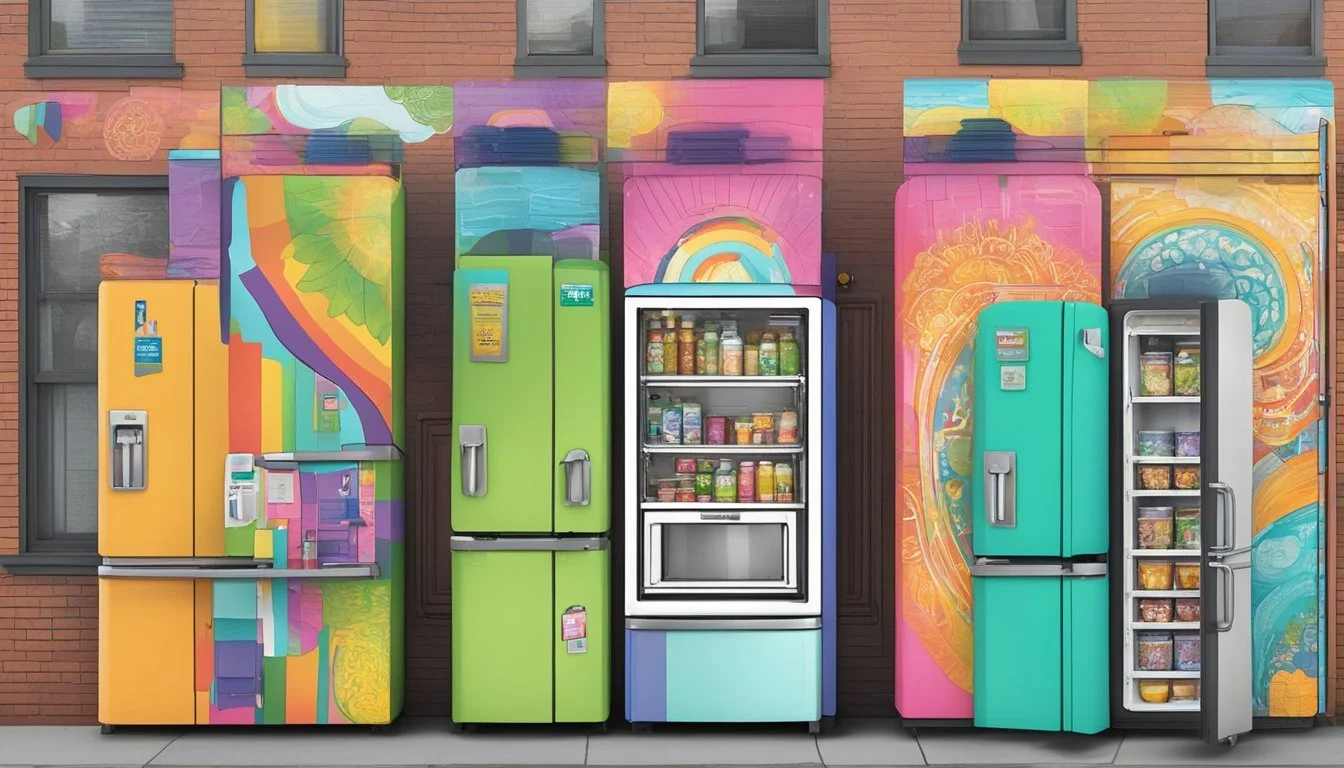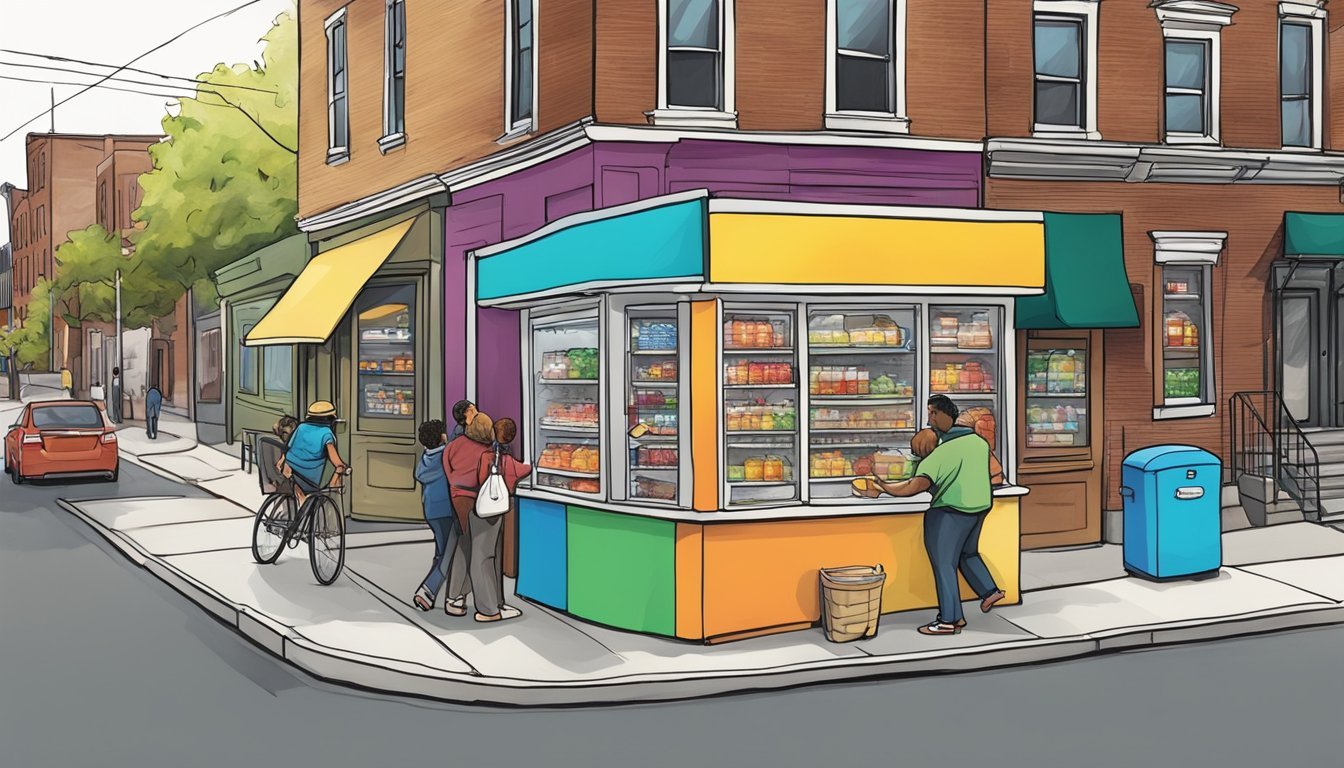Worcester, MA Community Fridge
Nourishing the Neighborhood with Shared Resources
In Worcester, Massachusetts, an initiative known as Worcester Community Fridges is combating food insecurity with a compassionate approach. These community fridges are strategically placed throughout the city, offering 24/7 access to fresh food for those in need. The concept is simple yet powerful: anyone can take what they need or give what they can. This grassroots movement not only addresses immediate hunger but also fosters a sense of solidarity and mutual assistance within the community.
The organization is acutely aware of the challenges faced by many families, with approximately 15% of Worcester residents experiencing food insecurity. The fridges, often located in front of local businesses, are stocked with a variety of fresh and healthy food items. By enabling easy and free access to nutritious food, these fridges play a crucial role in ensuring that the right to food is upheld for all community members.
Woo Fridge, one of the groups involved, emphasizes the dignity and human connection woven into this endeavor. They focus on nurturing community support rather than diverting from the larger goal of systemic change. Through the collaborative efforts of volunteers and the generosity of the community, Worcester's network of fridges serves as a testament to the city's resilience and collective compassion.
History and Mission of Worcester Community Fridges
Worcester Community Fridges is an organization committed to the belief that access to fresh food is a fundamental right. They provide a mutual aid-based approach to address the issue of food insecurity in Worcester, MA. The initiative operates on the principle of solidarity, offering community fridges that are accessible to all residents, 24/7.
Establishment: Launched during the height of the COVID-19 pandemic, the community fridge movement sought to combat the escalating levels of food insecurity, with studies indicating that up to 15% of Worcester families were affected. The pandemic exacerbated an already pressing need for food resources, prompting the organization to take meaningful action.
Operational Model:
Principle: Take what you need, give what you can.
Accessibility: Open around the clock.
Locations: Fridge sites throughout the city.
The organization's efforts revolve around creating a system that fosters community support and love, encouraging residents to both contribute to and benefit from the communal resources. The fridges are stocked with fresh, healthy food options, making them an invaluable asset to those in immediate need.
Outreach and Support: Worcester Community Fridges also maintains a robust online presence to coordinate donations and volunteer efforts. Their commitment to maintaining open communication channels has resulted in a strong community group online, furthering their mission with significant local engagement.
By emphasizing unconditional support and contribution, Worcester Community Fridges aims to ensure that residents have consistent access to nutritious food, while also nurturing a sense of community and mutual support among Worcester’s population.
Addressing Food Insecurity
In Worcester, Massachusetts, the community is taking a tangible step towards alleviating food insecurity through the establishment of community fridges. These fridges offer free, fresh food, contributing significantly to the health and well-being of residents.
Impact on Worcester Residents
Community fridges in Worcester operate under a straightforward, yet powerful ethos: Take what you need, give what you can. These spaces have become crucial in light of the fact that 15% of Worcester families have reported instances of food insecurity. Open 24/7, community fridges are a direct response to the structural harm caused by food scarcity, ensuring residents have daily access to nutritious food without cost or barriers.
Collaboration with Farms and Grocers
To maintain a steady supply of fresh food, Worcester community fridges collaborate with local farms and grocers. This partnership not only supports the local economy but also promotes sustainability within the community. Donations typically include:
Local Farms: Fresh produce, seasonal fruits, and vegetables.
Grocers: Surplus or unsold food items, including bread, dairy, and non-perishable goods.
Through these collaborations, the community fridges not only address immediate food needs but also foster a sense of mutual aid and support among different community sectors.
Locations and Accessibility
The Worcester Community Fridge, often referred to as Woo Fridge, provides a range of strategically placed refrigerators that are accessible to the community around the clock, addressing food insecurity head-on.
Main Street Presence
Woo Fridge has established a visible presence on Main Street, Worcester, ensuring that essential food resources are available to those in need. These fridges are positioned for easy access within the community:
College Square Fridge: Located at 695 Southbridge St, it is centrally positioned for those frequenting the main thoroughfares.
Neighborhood Expansion
Expanding beyond the main arteries of the city, Woo Fridge has effectively placed fridges in several neighborhoods, with the goal of making fresh food available 24/7:
Greendale Fridge: Situated at 16 Brooks Street, it serves the Greendale area.
Portland Fridge: At 44 Portland Street, this fridge is easily accessible to local residents.
Union Hill Fridge: Found at 42 South St, supporting the Union Hill neighborhood.
Each location reinforces the organization's commitment to maintain constant availability of resources, eliminating barriers for fresh food access across various neighborhoods in Worcester.
Community Support and Donations
The success of the Worcester MA Community Fridge program relies heavily on the generous contributions from local businesses and individual community members. It's a collective endeavor to tackle food insecurity and enhance access to fresh and nutritious food.
Business and Restaurant Contributions
Restaurants like Fantastic Pizza and other local eateries are critical allies in the Community Fridge movement. They contribute by:
Providing surplus meals and unsold food items.
Donating staple ingredients for food preparation.
Businesses, small and large, participate by:
Hosting fridge locations, making them accessible to the community.
Supplying logistical support and resources for maintenance.
Individual Donations and Volunteering
Individuals can contribute in the following ways:
Donations:
Pantry staples like bread, sugar, and flour.
Packaged and labeled perishable goods such as cheese, milk, and yogurt.
Homemade meals with clear packaging, including preparation date and ingredients.
Volunteering:
Supporting day-to-day operations, including fridge cleaning and restocking.
Organizing fundraising events or community drives for additional support.
The Worcester Community Fridge project invites engagement from all community members to sustain their pivotal 24/7 operations.
Operational System and Logistics
Worcester’s community fridge initiative operates on a system that ensures free, fresh, and healthy food is accessible around-the-clock. Key factors include a well-organized maintenance and management structure coupled with strict adherence to safety and health regulations.
Maintenance and Management
Management of the refrigerator units is a community-driven endeavor, with schedules and routines established to keep them clean and well-stocked. Volunteers and local organizations are pivotal, ensuring the fridges are not only functioning but also filled with a variety of healthy food choices. During the pandemic, the response grew to include increased sanitation practices and possible provision of personal protective equipment (PPE) for those handling the food.
Inspection: Regular inspections are conducted to ascertain that the systems are operational and the food offered is fresh.
Stocking: Community members contribute perishable and non-perishable items, adhering to guidelines that promote a balanced offering of nutritious food.
Safety and Health Regulations
Safety and health are paramount. The program is designed to comply with food safety regulations to prevent any health risks associated with perishable goods.
Cleaning Protocol: A rigorous cleaning protocol is in place for the refrigerators, ensuring they are sanitized and safe for food storage.
Quality Control: Donated food is checked for expiration and quality, and any items that do not meet standards are promptly removed.
By maintaining these systems, Worcester’s community fridge project aims to uphold dignity, support the community, and provide constant access to food resources, particularly during challenging times such as the ongoing pandemic.
Outreach and Community Impact
Worcester's Community Fridge plays a crucial role in fostering community connection through various outreach programs. These efforts not only alleviate food insecurity but also cultivate a sense of joy and responsibility among the residents.
Events and Initiatives
The Community Fridge organizes events that encourage residents to participate in food sharing. From filling the fridge with free, accessible produce to collecting canned goods, these initiatives demonstrate the value of community support over traditional systems of charity. Woo Fridge embodies this approach, emphasizing compassion and mutual aid.
Notable Initiatives Include:
Regularly scheduled fridge restock events
Community drives for food and essentials
Educational Programs
Education is paramount for sustaining the impact of Worcester's Community Fridge. The group conducts programs aimed at informing the public about issues related to food insecurity and how to contribute effectively.
Educational Efforts Encompass:
Workshops on nutrition and food safety
Distribution of informative materials via their website and social media
Success Stories and Testimonials
Worcester Community Fridges showcases stories of resilience and community impact through their initiative. Maria Ravelli, involved with the community fridge, has expressed optimism about reaching more neighborhoods. She highlights the project’s growth, aiming to have fridges in five different locations to address food insecurity comprehensively.
Echo Louissaint (Volunteer): "Seeing the tangible effects of our work gives us hope. It's about more than food; it's about community."
Local business owners and volunteers have echoed Louissaint's sentiment, reporting a significant sense of community bolstered by mutual aid. Patrons express gratitude, highlighting how the fridge not only provides sustenance but also fosters a spirit of sharing and caring.
Resilience and Passion:
Worcester Community Fridges perseveres throughout the year, with enhanced efforts during challenging times, such as hot summer days, when the need for hydrating foods spikes.
Passion-driven volunteers play a pivotal role, ensuring the fridges are well-maintained and stocked, embodying the community's spirit.
Highlight of Testimonials:
"The fridge helped me feed my kids during a tough week. It was a blessing." – Anonymous Resident
"This fridge is a symbol of hope. You take what you need and leave what you can. It's a simple, profound act of kindness." – Local Volunteer
These stories underscore the positive impact of Worcester Community Fridges on individuals and families, serving as a beacon of hope and unity in Worcester.
Future Goals and Aspirations
Worcester's community fridge initiative, led by organizations such as Woo Fridges, is focused on expanding its reach within the community. The primary aim is to combat food insecurity by providing free access to nutritious food items for all community members.
Key Aspirations:
Increase community engagement: Woo Fridges aspires to foster a sense of responsibility and participation among Worcester residents. They encourage the donation of food items and volunteer efforts to maintain and stock the fridges.
Minimize food waste: By redistributing excess food that would otherwise be discarded, these community fridges play a vital role in reducing food waste and promoting sustainability.
Expand the network: There are plans to establish more fridge locations throughout Worcester. This will ensure that community members have easier access to the resources they need.
Targeted Efforts:
Bag Lunch Initiative: The organization plans to launch programs like the bag lunch project to provide ready-to-eat meals, facilitating quick and hassle-free nutrition, especially for the unhoused.
Partnerships: They aim to create partnerships with local businesses, such as bakeries within the Printers Building, to supply a variety of fresh food items regularly.
Infrastructure Growth:
Enhanced Resources: As the network grows, Woo Fridges seeks to upgrade their infrastructure, which includes adding more robust refrigeration units and securing spaces that are accessible around the clock.
Technology Integration: There is also a focus on integrating technology, like tracking systems through printers to manage inventory levels efficiently and ensure a continuous supply of fresh produce.
These efforts underscore the organization's commitment to not only provide immediate relief but to also build a sustained, supportive environment for all individuals facing food scarcity.
How to Get Involved
Individuals looking to support the Worcester, MA Community Fridge can do so by volunteering their time or making food donations. The initiative relies on community involvement to sustain access to food and embodies a spirit of solidarity.
Volunteer Opportunities
Worcester Community Fridge depends on volunteers to keep the project running smoothly. Volunteers can help in various ways:
Monitoring Fridges: They ensure the fridges are clean and that the stock is fresh.
Food Pickup and Delivery: Volunteers collect donations from local businesses and deliver them to the fridges.
Individuals interested in volunteering can sign up through the Worcester Community Fridge website or get in touch with local coordinators like Saket Lohia.
Making Donations
Making a donation to the Worcester Community Fridge is a direct way to show love and support for the community, especially the unhoused neighbors. Here’s how to donate:
Food Items: Prepackaged frozen meals, pantry staples (bread, sugar, flour, canned goods), dairy products, and labeled homemade meals.
Prepared Meals: For homemade meals such as sandwiches, including peanut butter and jelly sandwiches, use clear packaging and label with the preparation date and ingredients.
Donation Sites: Drop off donations at designated Worcester Community Fridge locations.
All donated items should be fresh and within their use-by dates to ensure the safety and dignity of those who rely on the fridges.











